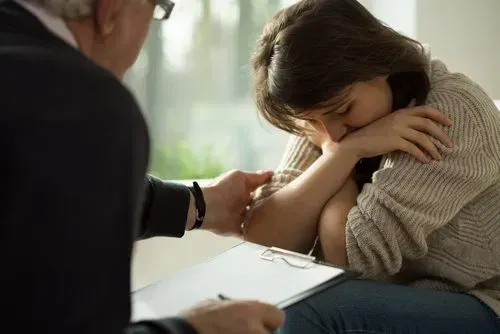Adolescent Counseling
in Lexington, Richmond & Frankfort KY
All children encounter issues or problems in their childhood. Growing up is not easy, and depending on their family situation, some children may face harder circumstances in which they need guidance and assistance from an adolescent counselor.
Adolescent counseling takes many different forms, including individual counseling, group counseling, family counseling, and others. Adolescent counseling provides an opportunity for your child to work through their problems and receive guidance from a trained adolescent counselor who can improve your child’s well-being.
Adolescent counseling focuses on your child’s problems, regardless of age. There are different types of counseling that may be particularly beneficial to your child, and your dedicated adolescent counselor can determine what kind of counseling might be best for your child.
Adolescent counselors are trained to help your child break down barriers, analyze their current situation and stressors, and provide solutions to relieve stress and move forward from their current stressful situation. The goal of an adolescent counselor is to help your child achieve the highest possible well-being and improve communication skills, stress relief, and anger management in order to live a more productive and happy life.
Your child might also have behavioral or mental illnesses that need treatment. Adolescent counseling can help isolate your child’s current situational problems from deeper problems which might require medication or specialized treatment. Resolving your child’s behavioral problems or treating their mental illness will relieve them from many problems they are facing. Of course, as a child matures and develops, a certain amount of stress and/or issues are common and expected, but an overly stressed child is not a happy one. Adolescent counseling will help your child identify their problems and resolve to fix them. Adolescent counseling can also help repair communication skills and help families resolve internal conflict. Adolescent counseling can be paired with family counseling in order to maximize the benefit for both the child individually and the family as a whole.
There are different types of counseling that might benefit your child.
Your child may receive counseling one-on-one. This is often called individual adolescent counseling. This allows an opportunity for the counselor to get to know your child and will allow them the opportunity to analyze your child’s situation.
Another option for individualized therapy is psychoanalytic therapy. Often coined “talk therapy,” your child will have the opportunity to open up and discuss their feelings and emotions. This is more appropriate for older children and teenagers as younger children might have trouble vocalizing their emotions and feelings.
In addition to individual therapies, group counseling might benefit your child. Group counseling is appropriate for children who are uncomfortable disclosing one-on-one to an adult. Group counseling is also beneficial as it shows your child that there are others suffering through the same problems, and they are not alone in their situation. Together, the group will discuss their problems and help each other brainstorm resolutions. Group counseling also helps children learn social skills, anger management methods, and stress relief techniques. Often, seeing that there are others in similar situations is stress relief in itself, because it helps your child not feel as isolated or misunderstood.
A specific type of group counseling that could help your child is CBT, or Cognitive Behavioral Therapy. CBT is used to break down negative thought patterns and replace them with positive, constructive thoughts. CBT will help your child recognize negative emotions and help them positively restructure them. As with generalized group counseling, CBT will help your child develop stress management tactics, learn anger management, and learn coping and relaxation skills.
Family counseling might also be appropriate for your child. Family counseling is commonly used when working with children. Family therapy can be used to accompany individual sessions, in order to bring familial issues to the surface and direct dialogue between the family members. Often, the child’s problem is not isolated just to the child; other members of the family are either contributing to the problem, or being affected by it. Family counseling will help alleviate tension in the family, and strengthen communication techniques.
For younger children who are either unable or uncomfortable communicating their emotions and issues directly to their counselor, play therapy can be used. Play therapy involves the use of dolls, puppets, toys, games, art projects, etc. to direct the therapy session. By involving the children in play, they are able to focus less on the therapy session and get engrossed in play. The adolescent counselor can then observe the setting, analyze the child’s behaviors, and try to lightly steer conversation while the child is slightly distracted. Play therapy is beneficial in helping young children relate to their therapist as they think of them less as an adult and more as a friend or peer. Performing adolescent therapy in a natural setting like play therapy is very effective in breaking down a child’s emotional barriers.
See how play therapy works.
You may not think your child’s issues are significant or debilitating, but there are many warning signs that should trigger an immediate response. Of course, through the developmental process, all children will go through one or two things on this list, but if you can tell that the child is being constantly affected, their issues are interfering with their life, or they are unable to control their impulses, you should seek adolescent counseling.
Some specific issues that suggest your child might need adolescent counseling are school stressors, including test anxiety, bullying, or trouble fitting in with peers, family issues, including death of a family member or divorce, abuse, trauma, neglect, or move or change of setting or school.
If you recognize any warning signs in your child, you should seek counseling immediately. Some of these warning signs are:
- Developmental delays including speech or language problems
- Toilet training issues, regression or bedwetting
- ADD/ADHD or other learning/attention problems
- Teen pregnancy or inappropriate sexual behavior
- Anorexia or bulimia
- Lack of interest in favorite activities or friends
- Bullying
- Insomnia
- Mood swings
- Depression
- Hopelessness
- Changes in appetite
Based on research from the Surgeon General, in 1999, 20% of children between 9 and 17 have psychiatric disorders. Even if the symptoms above do not seem pressing, leaving your child’s problems unresolved could lead to irreversible damage in your child and your family. Seeking attention at the onset of these symptoms is vital for your child’s well-being. Unresolved issues can stunt development or cause trauma for your suffering child.
Start adolescent counseling today.
Don’t wait. Call us at 859-338-0466 or contact us today!
Our practice offers many types of counseling and we are prepared to help you and your child through this difficult time. We have multiple locations in order to best serve your family. View the Counseling Process section of our website to find out details about getting started.
Set up your appointment today with one of our professionals.
- Darby Creek Lexington, KY 501 Darby Creek Road, Lexington, KY, United States
- Duval Street Location Lexington, KY 1092 Duval Street, Lexington, KY, United States
- Frankfort, KY 105 Diagnostic Dr, Frankfort, KY 40601, United States
- 1043 Center Dr, Richmond, KY 40475, United States 1043 Center Dr, Richmond, KY 40475, United States








